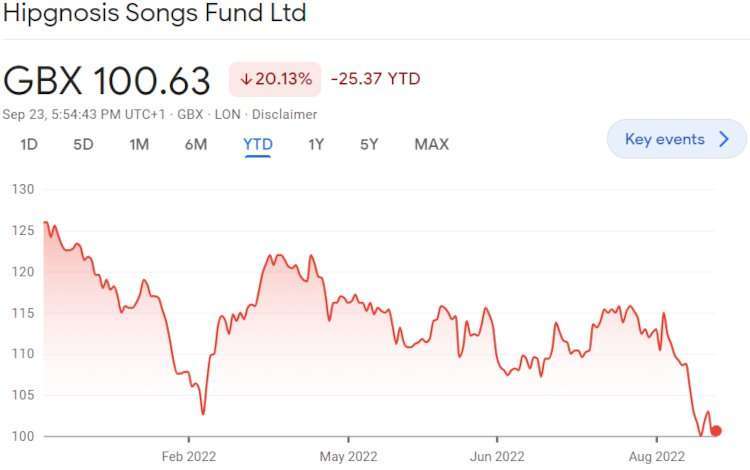
After two less-than-positive assessments of Hipgnosis Songs Fund’s long-term outlook entered the media spotlight earlier this month, the price of the entity’s stock (LON: SONG) touched a 2022 low. But according to an analysis from J.P. Morgan, SONG still “offers compelling value.”
Per the Financial Times’ critical accounts of Hipgnosis Songs Fund’s position, the London-headquartered song-rights investor – which, until pausing new deals in August of 2021, had been acquiring all manner of high-profile catalogs – has “burned through its funds and is unable to raise more because its stock price has fallen.”
Moreover, the outlet’s latter look at the operations of Hipgnosis, published about one week ago, relayed that the sole catalog appraiser for the business has thus far “resisted” retooling its valuation process to reflect heightened interest rates.
If this appraiser — Barry Massarsky of Massarsky Consulting — “were to start using higher interest rates as part of his calculations – reflecting rising real-world rates – the valuation of tens of thousands of songs would fall, potentially wreaking havoc for investors who have used debt towards the purchases,” FT stated. Massarsky Consulting is now owned by Citrin Cooperman Advisors LLC.
On the heels of these breakdowns, Hipgnosis stock dipped to a 2022 low of GBX 98.50 – representing a more than 25 percent falloff from its value at 2022’s beginning – before rebounding to around GBX 105 and finishing today at GBX 100.63.
Notwithstanding the decline, which precludes the issuance of new shares, as mentioned, J.P. Morgan expressed a largely positive view of Hipgnosis, including because it’s “optimistic about” the songs fund’s “revenue over the coming year.”
Explaining the stance and its overweight rating, J.P. Morgan cited Hipgnosis’ recently announced plans to continue paying a dividend, the expected refinancing of its credit facility next month, increased royalty rates, and ongoing “streaming growth, with price rises likely to come.”
“The main negatives are rising interest costs and non-dollar income, though both of these are in our estimates, and we are hopeful that the refi will enable us to improve our estimates,” J.P. Morgan wrote. “Given the long term growth potential of the asset class, and the higher quality (in our view) portfolio relative to RHM, we believe SONG offers compelling value and reiterate our Overweight recommendation.”
Worth mentioning in conclusion is that HSF’s annual general meeting, which took place on Wednesday, also brought with it the passage of a stock-buyback resolution that will specifically allow for “market acquisitions…of its [HSF’s] ordinary shares either for retention as treasury shares, insofar as permitted by the Law, or cancellation.”
A separate resolution (which likewise passed with overwhelming support) enables Hipgnosis directors “to allot and issue or make offers or agreements to allot and issue, grant rights to subscribe for, or to convert any securities into ordinary shares…for cash up to the aggregate number of 60,560,714 ordinary shares.”
Lastly, Amy Thomson has officially stepped down as Hipgnosis’ “chief catalog officer,” indicating in a statement that she will remain a consultant while beginning to work full time on her newly developed catalog-management platform.

